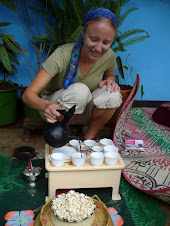If the result of the game wasn’t clear from the triumphant roars emanating from the stadium, if it wasn’t demonstrated in the chanting, flag-waving crowds streaming into the streets, then it could certainly be read unmistakably in the downcast faces and sullen silence of the three girls from Mauritania who had been sitting in the row behind me.
The World Cup qualifying match between Ethiopia and Mauritania had packed an impressive crowd into the Addis Ababa stadium. A reported 13,000 people were in attendance, and yet we still managed to seat ourselves in front of the handful of Mauritanians – dignitaries, officials, and their families – who had flown across the continent to see the game.
The first half ended in a 1-1 tie, an Ethiopia goal off a penalty kick in the 38th minute and a quick answer by Mauritania. But Ethiopia ran away with it in the second half and went on to claim a punishing 6-1 victory, with 3 goals coming in the last 10 minutes. I don’t know much French, but I do know enough swear words to recognize that the Mauritanian teenagers in the stands behind me were using a dazzling array. When the sixth Ethiopia goal found the back of the net in the 90th minute, though, all other sounds were drowned out by the screaming of the host country fans. Hordes of ecstatic fans poured over the chain link fences to greet their team on the field – only to be chased back over by a menacing sea of blue camouflage and brandished clubs. So the energy, noise, and mania diverted itself outside the stadium and spread out over the city, and we were swept up in it. All the way back to our hotel, we waved the little paper Ethiopian flags we had pilfered from deserted seats in the stadium, and sang along with Amharic chants that we at least mostly understood.
People sometimes ask me why I like sports. I think one of the most interesting things about the world of sports is how it provides a common ground, where people from different cultures, different backgrounds, different situations in life can meet and engage each other. The rules and goals are clearly defined and universal, the environment is familiar and controlled, the competition connects people from all over the world. I might not understand all the joys and pains associated with being an Ethiopian child growing up on the streets of Addis Ababa, a working Ethiopian father having lived through the desperation of the 1984 famine, an Ethiopian mother striving to raise her family of seven. But watching that game today and taking part in the celebrations, together we could all share the joy of victory, even if only for a moment. And had the result been different, we would have shared the ache of defeat. The distinctions of nationality, ethnicity, class, gender, and skin color that too often erect barriers between us are trumped by our loyalty to a common side. Perhaps the context seems trivial, but the connection never is.
The triumphant clamor that stretched out over Addis Ababa today rose up from a crowd of businessmen, bus drivers, and beggars, priests and politicians, soldiers and students, rich and poor, male and female, young and old, literate and illiterate, black and even a handful of white. Their song was communal, their joy was shared, and the crowd was one.
skip to main |
skip to sidebar

Modern Tales of a Southern Girl in an Ancient Land

My Ethiopia Photos
- My Welliso Pics
- More Welliso Pics
- Other Welliso Pics
- Last Night in Welisso
- Peace Corps Swear-In
- Life in Debremarkos Pt. 1
- Life in Debremarkos Pt. 2
- Little Travels Around Ethiopia
- Sodere and In-service training
- Simien Mountains
- Gonder
- World Cup Qualifier
- More from Markos
- Welliso Wedding
- Bahirdar Fun
- Here and There
- Excursion into the Hills
- Lalibela
- Round and About
- Timkat In Gonder
- Life Continues in Markos
- Fasika in Assela
- Shashemane, Wolaita, Arba Minch
- Mertolemariam
- Bale Mountains
- Random Others
- Up North
- Out West
About Me
I'm here in Ethiopia for the next couple of years. I'm experiencing new things, encountering new ideas, and generally trying to sort out myself and the world around me. I'm meeting new people, discovering their stories, and opening myself up to be profoundly impacted by them. Hopefully along the way I'll do some good.
Disclaimer
The views expressed on this site are mine alone and do not necessarily represent the opinions of the Peace Corps or the governments of Ethiopia or the United States.
My Address
Christen Marie
P.O. Box 141
Debremarkos
Ethiopia
P.O. Box 141
Debremarkos
Ethiopia
No comments:
Post a Comment